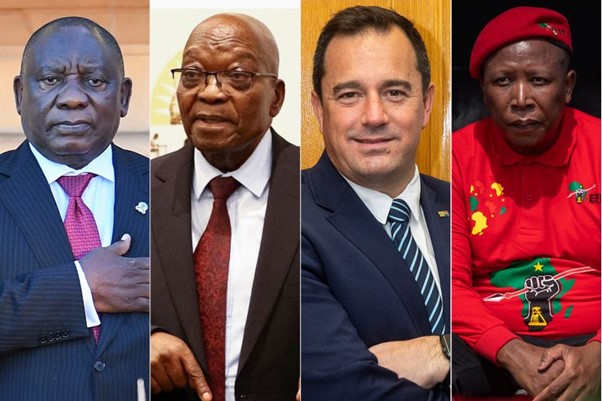South Africa’s May 29 parliamentary elections produced no clear winner with a mandate to rule by itself, forcing the ruling African National Congress (ANC) to start negotiating with potential coalition partners from the three big parties.
For the first time in 30 years, ANC national support dipped below 50% – it plummeted to 40.18% – leaving the liberation party marooned on a political island. It can only govern with the concurrence of the biggest opposition parties.
In terms of the election calendar, parliament should convene 14 days after the announcement of results for the swearing-in of members of parliament and thereafter elect the state president. To be declared president, a candidate needs at least 201 votes from the 400-member national assembly.
The ANC’s 40.18% translated to 159 MPs, 42 short of the required absolute majority. The other top three parties after ANC are the main opposition Democratic Alliance (DA) which got 21.81% of the national vote (87 MPs); the newly formed uMkhonto weSizwe (MK) led by former president Jacob Zuma 14.58% (58 MPs); and the Economic Freedom Fighters (EFF), which had 9.52% (39 MPs).
The ANC is ideologically closer to the MK and EFF, but since both parties are splinters from the ruling party, negotiations may stall over personality clashes. Both MK and EFF have made some noise that President Cyril Ramaphosa should step down as a pre-condition to any coalition.
On the other hand, the liberal DA can be a stable partner that is preferred by the business community and some in the international quarters, but it remains the proverbial enemy among the majority of South African blacks because of its background in apartheid and support for capitalism.
Politics can make strange bedfellows, and this is most likely to happen in South Africa. Negotiating teams have been set up and horse trading has started far from the public glare, but crucially, the clock is ticking down to June 15. Failure to agree will necessitate fresh elections, and no one knows how that will play out.
The developments are being watched by the world in general and Southern Africa countries in particular. Countries in the region, particularly those still governed by former liberation movements in Angola (MPLA), Mozambique (FRELIMO), Namibia (SWAPO) and Zimbabwe (ZANU PF) are acutely aware that ANC fall will have a domino effect on them.
In Zimbabwe, analysts in and outside the government have come out strongly stating their positions.
President Emmerson Mnangagwa spokesperson George Charamba posted on microblogging site X (formerly Twitter) saying ANC is in crunch time and has to go full popularist.
Charamba wrote: “I argue that Malema and EFF’s historic mission was never to govern, it was to agenda-set and cause-promote! On that, it did superbly well!
“Whichever way the election goes, Nelson Mandela’s neoliberal agenda is now dead, very dead! South Africa politics have now entered the bite-the-bullet radical phase!”
On the other hand, journalist Hopewell Chin’ono argues that Zanu PF is scared by developments in South Africa.
Chin’ono wrote: “The worst nightmare for ZANU PF is an ANC/DA coalition with a DA foreign minister, that is giving ZAN UPF violent bouts of political diarrhoea.
“I said in April that this election was not just about South Africa, it was about the region too, and the result will have far-reaching repercussions in Zimbabwe and beyond because of South Africa’s position not only in SADC, but the continent as the biggest and most sophisticated African economy.”
Closer home, South African business prefers an ANC/DA coalition. Old Mutual Investment Group’s Chief Economist told Reuters that markets would view a coalition between the ANC, DA and the social conservative Inkatha Freedom Party (IFP) favourably due to ‘the promise of more policy reform, stronger implementation, and a firm stance against corruption.’
It is still early days, but so many things are going to change after the negotiations are sealed. However, two things are certain: the ANC will never be the same again and for President Cyril Ramaphosa, this is the beginning of the end.
For the other liberation movements, it’s crunch time as they keep a keen eye on developments, fearing they could be next. Mozambique and Namibia are holding elections soon.
It could be the era where liberation movements have to look themselves in the mirror and introspect or they become the yester-year parties—only some glorious independence parties that failed their people.



